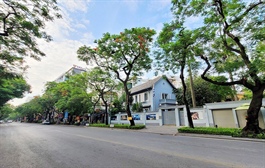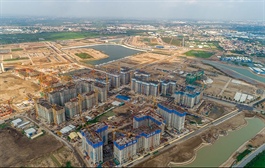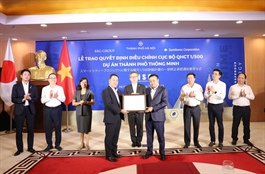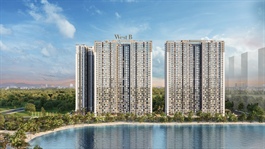Revenue sharing going some way to ease condotel status
Revenue sharing going some way to ease condotel status
The real estate market for resort villas and condos is showing signs of short-term recovery from a difficult period due to low liquidity.

ST8 Development made a bold move last week when it announced that it would develop the Tram Huong Resorts project in the south-central province of Khanh Hoa across 4.5 hectares. It is to include 25 villas, 47 shophouses, almost 100 condotel rooms, and over 270 hotel rooms, with a total investment of $85.6 million.
“We are aware that the market now is not in its most favourable condition for the condotel segment. However, we are heading to the short future when the tourism industry is gradually resumed with increasing inbound and outbound are much more active,” said an ST8 representative.
The Ministry of Construction said that the tourism real estate segment was having an impressive recovery in the first half of this year with a total of eight projects have been completed, bringing to the market 3,385 resort condotels and officetels, an increase by over 130 per cent compared to the second half of last year.
Meanwhile, a market report from DKRA released last week indicated signs of recovery in the resort real estate segment.
In the second quarter, the condotel market recorded 122 units sold, 78 per cent lower than the same period last year, but a more than 20-fold compared to the previous quarter. The absorption rate in the condotel market in the second quarter also reached 32 per cent, exceeding 3 per cent in the first quarter of the year.
Only nine units of sea villas were sold in across the country in the first three months, but this increased to 50 units in the second quarter.
According to the DKRA report, the supply of condotels rose sharply compared to the previous quarter but remained at a low level, equivalent to only 39 per cent over the same period.
“Market demand has grown compared to the previous quarter, but still at a low level, 78 per cent lower than the same period last year. The majority of transactions in the quarter focused on projects with complete legal status, guaranteed by banks and operated by international 4-star and 5-star operators,” said Vo Hong Thang, director for Research and Development at DKRA.
The asking price of condotels did not change much compared to the previous quarter but recorded an increase of 2-4 per cent over the same period last year, the lowest increase in the past five years.
According to Thang, the trend of shifting from profit sharing to revenue sharing continues to be widely applied by many investors. Revenue sharing helps condotel customers to manage business efficiency as well as be assured of the transparency of cash flow.
For beach villas and resort shophouses, the supply, although increased compared to the previous quarter, was still very low, at only 4 per cent over the same period of last year.
Investors are still quite cautious in launching new products to the market, causing the supply to downtrend from the middle of the second quarter of 2022 until now.
As the market is still quiet, and interest rates still relatively high, tourism has not fully recovered as expected, so liquidity in this segment is expected to remain difficult.
Nguyen Duc Hung, an investor in a condotel in the central city of Danang, said that there was a time when there was a situation where people were selling and cutting their losses in condotels, but since the end of 2022, that had stopped.
“Currently, rental demand has been significantly improved since the tourism and visa release was announced. Investors like us are waiting for new signals that will bring exciting waves to this market in the year-end,” Hung said.
A market report released last week by Colliers Vietnam added that the resort real estate market is moving below expectations.
A May decree which amends and supplements a number of articles guiding the implementation of the Law on Land, meaning tourist accommodation built on commercial and service land will be certified for ownership of land-attached construction works, has been described as a vague and confusing for the local authorities, according to Colliers.
In reality, the issuance of ownership books has fallen behind expected levels and thus there is still a lot of work to implement the decree.
The Vietnam Real Estate Association (VNREA) forecasts that it will not be until the end of the third quarter of 2023 that the resort real estate market will have a clear signal of improvement.
According to the VNREA, only projects with strong finance, clear legal status, and fast construction progress will see transactions, while most other investors will still face difficulties. “To accelerate the recovery, competent authorities need to urgently remove legal barriers in order to clear numerous backlogged and unfinished projects,” it said.






















